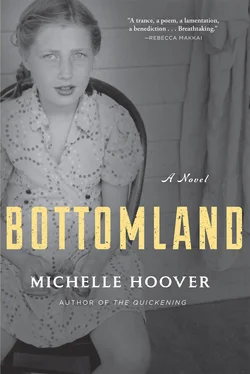Already I worried about my decision to leave home. To think I had wanted but a small bit of soil. Something not carved out by my father or his father before him. Yet almost every acre in my country had already been claimed. The thought of my father once he discovered my absence troubled me further still. The morning I went, I planned to leave hours of road behind me, long before my parents stood from their beds. I took a loaf of bread. A knife with which to cut it and keep for my protection. The cows I milked. The milk I poured in a jug for my mother. My bed I straightened, my church shoes placed at the door for one cousin to have or another. I had no heart to write a note. The cows would tell enough. The story, it would circle the village. How the son made well what was needed of him. How he had started in the darker hours to finish it. I imagined my father lifting his hat in the barn to find the cows asleep. Their stomachs would be full, their pails heavy with milk. I imagined my mother happening upon my bed and lifting the sheet. At its touch, warm or cold, she might guess the hour I had gone.
Week after week I trolled for work in that city, only to return to a different boardinghouse. I now had a room of my own with a lock. Still, my pockets had grown thin. My stomach suffered cramps. Outside in the hall, a washerwoman sang to herself as she scrubbed the floor. I opened my door to hear her better. “ Brauchen Sie irgendetwas? ” she asked, turning. Are you all right? Need you anything? “ Nichts ,” I answered. Her German held the thick lilting hum of the southern states, her s ’s full between her teeth. Every word she spoke trailed from the roof of her mouth. At once I felt the home I had left restored to me. The woman wore hard wooden shoes. Her torso was narrow, her neck long. It rose to a faint line of hair, more white than blond and tied in a net. Without stopping her hands, she rinsed her rag in a bucket, wrung it, set it to the floor. Her singing never dropped a note. Despite the sorry house, she seemed to hold its very cleanliness on the tip of her thumb.
Mornings passed. I saw her many a time. Margrit was her name. An orphan. Her father gone to drink, her mother dead. At the age of twelve she had sold her family possessions to make the passage across. What little of Germany she knew remained in the language she spoke, her sense of work. She cared for that boardinghouse like her home.
“ Brauchen Sie irgendetwas? ” she asked.
“ Nichts ,” I answered again. Still I was growing more reluctant to close that door between us.
Inside the daylight hours, I continued my search for employment. Often I passed the same forlorn sheet of paper tacked to a post. An advertisement, in German no less. acres by the millions. lands for sale. It showed a crude drawing of a railway cutting between miles of grass. I brought it to the man at the boardinghouse desk. Margrit held the sheet close, a translator for us. I was to purchase my train ticket. Labor in the place day and night to fill my pocket. Offer my bid within thirty days. “My own brother did it, and my dad. But not me,” the man explained. “Nothing there but dust.” “ Nur Staub ,” Margrit said. But dust, I thought, it needs soil to run beneath it. More land than could fit inside a fence. Margrit rolled the paper neatly, warmed it in her hands. When she offered it back, it seemed a gift. When next I saw her, I had a different answer to her question.
“ Brauchen Sie irgendetwas? ” she asked. “ Ja ,” I said.
Margrit and I were a week later married. With my last dollars, I purchased our tickets west.
They say one countryside is like another. There are horses and cattle. The smell of dung. At home, my father owned a small farm of forty acres where we raised wheat and maize. Yet as soon as our train crossed into the western plains, I knew this land would be different. The maps showed a state bordered on both sides by rivers. The Mississippi on one. The Missouri the other. A mouthful both of them, wide as any plain. Iowa. The word gives nothing for the tongue to hold. Still when we arrived, it seemed wholly settled, if only in the steadiness in its terrain. In Iowa, I held my hand level to the earth, my fingers splayed. If I squinted right, the very crevices in my skin disappeared into the dust. There was little difference between me and it.
Yes, this suits, I thought. It will a man and his family feed. It will bear a house on acres enough to build further still. With Margrit at my side, I believed this country held no trickery or grief. It was only as it seemed.
It was late in the summer when Margrit and I arrived on our stake of land. Our wagon was full. Our pockets drained. Bottomland, we had been promised. But I feared a rich soil swamped up to our britches. Only the spring before, we were told, the channels in the northeast had swallowed their banks. When the waters retreated, the soil was black as ink. Flat as an ironed sheet. Now the river stayed in its bed, a murky line that marked the border of our land. We had but a hundred and fifty acres, so far from the closest village we had earned twice our dollar. With the savings, we purchased a team of horses. A dairy cow and chickens. A plow and harrow for planting. At first only ten of our acres were broken in, the rest overrun with prairie grasses. An abandoned dugout stood in the southeast corner, so narrow it held no more than a cot. The door fell off at a touch, little better than a piece of canvas. The agent told us two brothers had run of the place. In the months before, the dugout had been found deserted. All that remained was a starveling dog tied to a post, a packet of tobacco hidden in the wall. Now both dog and tobacco were gone.
We ducked our heads. The roof was never so tall for a man to stand. Margrit reached for the ceiling. Her fingertips blackened. “ Wie ein Grab ,” she said and wiped her hand on her skirts. No better than a grave. She left our bedding outside. “I am not sleeping in it. Might be fine for dead brothers, but I am far from that.”
“If it rains?”
“We drown.”
“And snakes?”
She considered. Out of her trunk, she uncoiled a woolen rope intended to hang sheets. She laid the rope around our blankets. “To confuse the snakes.”
That afternoon we built a shanty from discarded tree limbs and covered it with bark. The sun would in a week curl the bark. Yet for our first evenings, the shanty suited us. A proper house, I promised Margrit, with a wooden frame. It would be finer than the log cabins we had seen, only earth and grass to fill the cracks. Margrit gazed about the prairie. No tree stood larger than an old man.
The animals we roped together behind the dugout where they ceased to whine. I scraped out a circle of dirt and lit twigs for a fire. What dried codfish we had was sweet, with meal to fill it. Our husks of corn buttered our chins. Around us, the fields stretched, the zikaden singing. Where we camped seemed the bottom of a bowl. So steady that wherever a man set his foot, it would remain. As would every wall he built. Every pole of a fence. When at last Margrit began to sing, it was a song I knew from my own mother. She had been born in the south of the country, where farming lands were little but gardens and German sons tried their hands at blacksmithing instead. Margrit stretched her legs to the fire and lifted her skirts. She rested my hand on the flesh of her knee. I felt every muscle of her thigh and the blood going there, alive as the good earth beneath us. She dropped her head against my shoulder.
“ Wo sich Fuchs und Hase gute Nacht sagen ,” she said. Where the fox and hare say goodnight.
Later we slept. Margrit buried her hand in mine and rested a foot across my ankle as if I might drift. Clouds to the east grew heavy. What stars appeared seemed distant. Owls screeched in the trees far along the river. Farther yet, the moan of a wolf. We had arrived. Now we but needed to show how we deserved this place. How everything it held would with faith and sweat be earned. Our sons never would vanish and leave their good shoes by the door. The silence seemed to promise this very thing. I felt none of the loneliness I had often known. Still as I closed my eyes, I sensed myself floating. Waters ran far beneath the earth at my spine. In the quiet, I heard nothing save for the river as it gushed and I felt all of it spinning. We might in any moment be drowned.
Читать дальше












